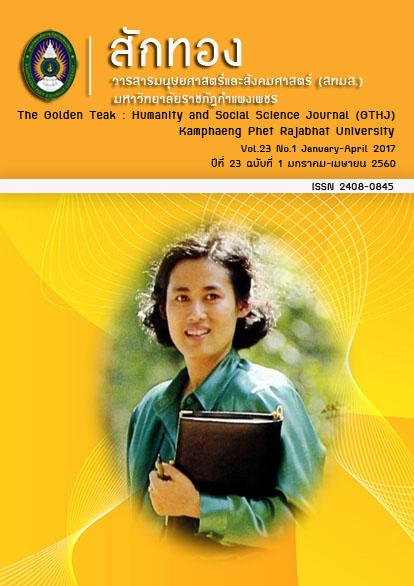รูปแบบการจัดการดูแลแบบประคับประคองสำหรับผู้ป่วยมะเร็งระยะลุกลาม โรงพยาบาลวังเจ้า จังหวัดตาก
Main Article Content
Abstract
บทคัดย่อ
การวิจัยครั้งนี้เป็นการวิจัยและพัฒนา มีวัตถุประสงค์เพื่อ วิเคราะห์สภาพการณ์และความต้องการการจัดการดูแลแบบประคับประคองสำหรับผู้ป่วยมะเร็งระยะลุกลาม โรงพยาบาลวังเจ้า จังหวัดตาก สร้างรูปแบบการจัดการดูแลแบบประคับประคอง และประเมินความเหมาะสมของรูปแบบการจัดการดูแลแบบประคับประคอง ที่สร้างขึ้น ผลการวิจัยพบว่า 1) สภาพการณ์การจัดการดูแลผู้ป่วยมะเร็งระยะลุกลามโรงพยาบาลวังเจ้า ภาพรวมอยู่ในระดับปานกลาง โดยยังพบว่ามีปัญหาทั้งด้านโครงสร้าง ด้านกระบวนการและด้านผลลัพธ์ และมีความต้องการพัฒนาทุกด้าน 2) รูปแบบสร้างขึ้นจากผลการวิเคราะห์สภาพการณ์และความต้องการการจัดการดูแลแบบประคับประคองสำหรับผู้ป่วยมะเร็งระยะลุกลาม เป็นรูปแบบที่ใช้บ้านผู้รับบริการเป็นฐาน มี 3 องค์ประกอบ ได้แก่ ด้านโครงสร้าง ประกอบด้วย มีการกำหนดนโยบายที่ชัดเจน มีมาตรฐานการปฏิบัติ มีพยาบาลผู้ประสานงานระหว่างทีมสหสาขาวิชาชีพ และอาสาสมัครประจำหมู่บ้านเข้ามามีส่วนร่วมในการดูแล ส่งเสริมบ้านผู้ป่วยให้เข้มแข็ง ด้านกระบวนการ ประกอบด้วย มีการจัดการดูแลแบบองค์รวม เน้นการดูแลด้านจิตสังคมเชื่อมโยงทุกระดับของบริการสุขภาพ ด้านผลลัพธ์ ประกอบด้วย ผู้ป่วยและครอบครัวสามารถจัดการดูแลตนเองได้ มีความพึงพอใจในชีวิต และมีคุณภาพชีวิตดี ด้านผู้ให้บริการมีสมรรถนะในการดูแลแบบประคับประคอง และ 3) รูปแบบการจัดการดูแลแบบประคับประคองที่สร้างขึ้น พบว่าเป็นที่ยอมรับและสามารถนำไปใช้กับโรงพยาบาลวังเจ้าได้ สำหรับโรงพยาบาลอื่นที่ต้องการนำรูปแบบที่พัฒนาขึ้นไปประยุกต์ใช้ ควรสำรวจความต้องการและคาดหวังของผู้ให้บริการ ผู้ใช้บริการ ตลอดจนครอบครัว ชุมชนและความสอดคล้องกับบริบทของโรงพยาบาล
A Model of Palliative Care Management for Patients with Advanced Cancers at Wangchao Hospital in Tak Province
ABSTRACT
The purposes of research and development were : to analyzed the situation and needs of palliative care management for patients with advanced cancers at Wangchao Hospital in Tak province, to develop a palliative care management model, and to evaluate the appropriateness of the developed model for advanced cancers patients. The research findings were as follows. 1) The situation of palliative care management for patients with advanced cancers at Wangchao Hospital in Tak province was at the medium level. Some problems in terms of structure, process, and outcome were found, and all aspects needed to be improved. 2) The patients’ home care model was developed based on the analysis results of situations and needs for palliative care management of patients with advanced cancers. This model comprised 3 components: structure, process, and outcome. Structure: Clear policy must be specified. Standard guidelines must be established. Nurse - coordinators must be arranged. Village health volunteer participated in caring and promoting patients’ home, so this model will be strong. Process: Holistic palliative care management which focusing on caring patients’ mind and society must be organized and connected to every level of health care services. Outcome: Patients and their families could manage their care. They were satisfied in their life and quality of life. Health care providers had their competencies for palliative care management. 3) After implementation, the model was appropriate. If the developed model will be implemented in the other places, needs and expectations of health care providers, patients, families, the community, as well as the hospital contexts should be conducted.
Article Details
บทความที่ได้รับการตีพิมพ์เป็นลิขสิทธิ์ของวารสาร สักทอง : วารสารมนุษยศาสตร์และสังคมศาสตร์ สถาบันวิจัยและพัฒนา มหาวิทยาลับราชภัฏกำแพงเพชร
ข้อคิดเห็นใดๆ ที่ปรากฎในวารสารเป็นวรรณกรรมของผู้เขียนโดยเฉพาะ ซึ่งมหาวิทยาลัยราชภัฏกำแพงเพชรและบรรณาธิการไม่จำเป็นต้องเห็นด้วย

